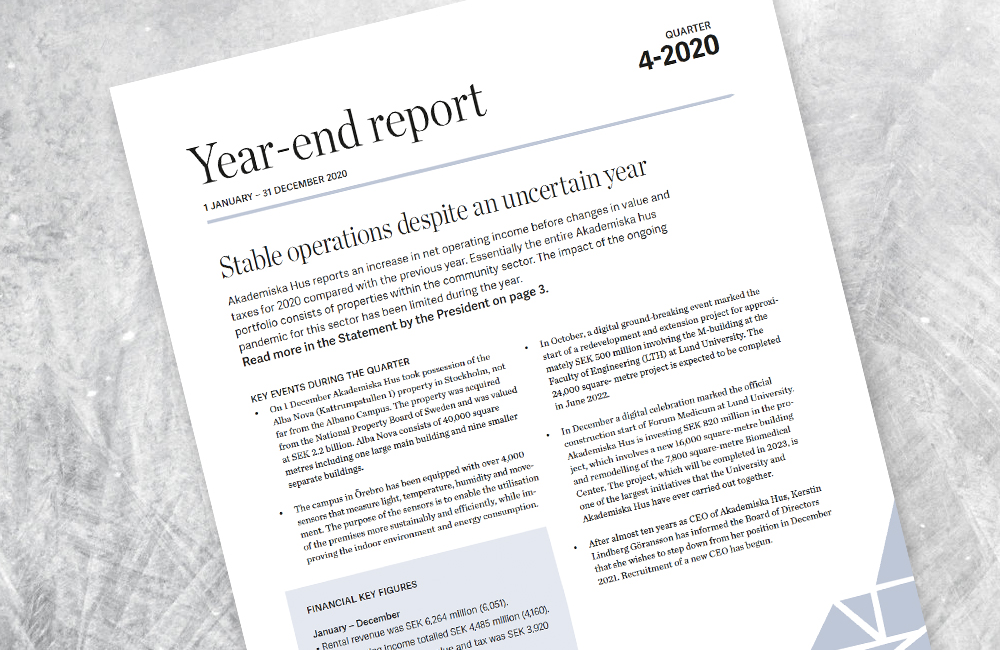Year-end report 2020: Stable operations despite an uncertain year
Wednesday, 17 February 2021
Year-end report 2020 in brief:
FULL YEAR
- Rental revenue was SEK 6,264 million (6,051).
- Net operating income totalled SEK 4,485 million (4,160).
- Profit before changes in value and tax was SEK 3,920 million (3,589).
- Changes in property values totalled SEK 3,141 million (3,872), which corresponds to a 3.7 per cent (4.8) increase in the value of the properties.
- Total financing cost was SEK -573 million (-880), of which SEK -192 million (-503) relates to changes in the fair value of financial instruments.
- Profit before tax was SEK 6,869 million (6,957) and profit for the period was SEK 5,440 million (5,658).
- Investments in redevelopment, extensions and new construction totalled SEK 2,872 million (3,266).
- The yield (excluding properties under construction and expansion reserves) was 5.0 per cent (5.0) over the past 12 months.
- The Board of Directors proposes a dividend of SEK 2 142 million (1,905) to the 2021 Annual General Meeting.
The decision to close campuses in the spring semester and switch to distance learning and digital working methods entailed a revolutionary change for the centres of education, which had to reorganise their operations in a very short time. The number of international students was cut in half in the autumn semester and research was affected by factors such as changes in the allocation of research grants.
“2020 was a year unlike any other in modern times. Despite the circumstances, we have engaged in an extremely close and constructive dialogue with our customers in order to assist them with their activities. We have also supported our service tenants on campus with various temporary measures during the year, such as rent reductions and deferred rent,” says Kerstin Lindberg Göransson, CEO of Akademiska Hus.
The main portion of the Akademiska Hus portfolio consist of community properties. This segment has, with their low vacancy risk and predictable cashflow, together with the housing segment, proved to be most resilient during the current pandemic. At year-end the assessed fair value of Akademiska Hus’ properties totalled SEK 99.6 billion, an increase of 9 per cent compared with the end of 2019.The company’s liquidity also continues to be robust and interest in Akademiska Hus’ long-term bonds has been strong.
In December Akademiska Hus acquired the 40,000 square-metre Alba Nova building (Kattrumpstullen 1) in Stockholm, valued at about SEK 2.2 billion. Through this purchase, the company can assume overall responsibility to an even greater extent for the development of the Albano Campus into a modern and competitive knowledge environment.
An array of construction starts occurred in 2020, including Natrium at Medicinareberget in Gothenburg, Forum Medicum and the M-building in Lund, as well as the remodelling of the Retzius Laboratory at Karolinska Institutet. Over the past year the first phase (Building 3) of the multibillion Albano project in Stockholm was also completed and ready for occupancy, as was the first phase of Nya Ångström in Uppsala. Approximately 400 undergraduate and graduate students were also able to move in to the Akademiska Hus student housing projects Polstjärnan in Luleå and Hydra in Uppsala.
In 2020 Akademiska Hus implemented an array of initiatives to achieve its climate targets. For example, the company continued to invest in solar panels. In all, Akademiska Hus has almost 70 facilities in its property portfolio that generate almost 6 million kWh of sustainable electricity annually for Swedish centres of education.